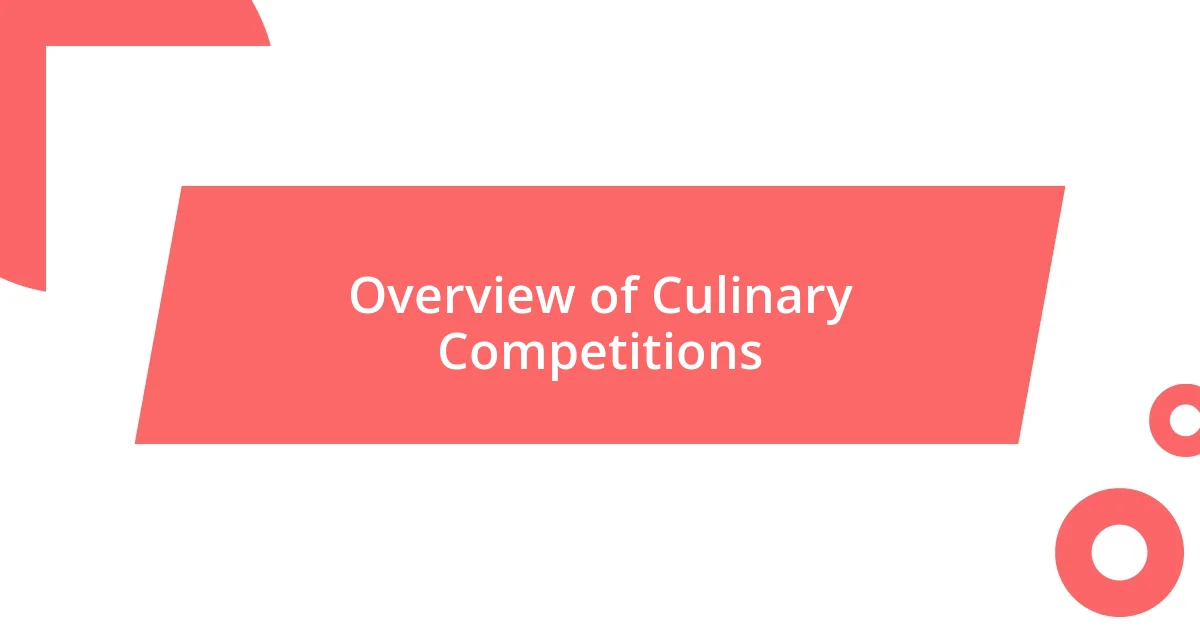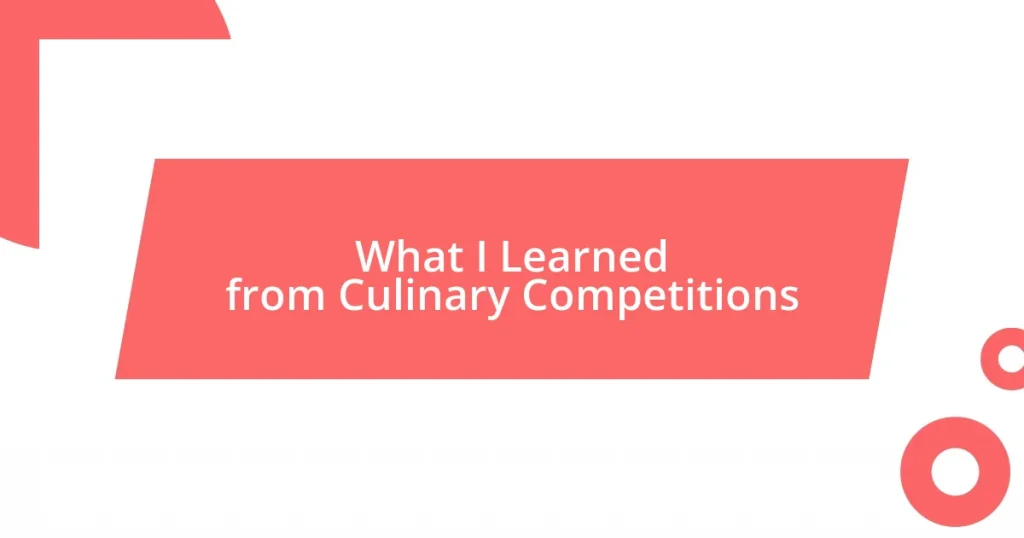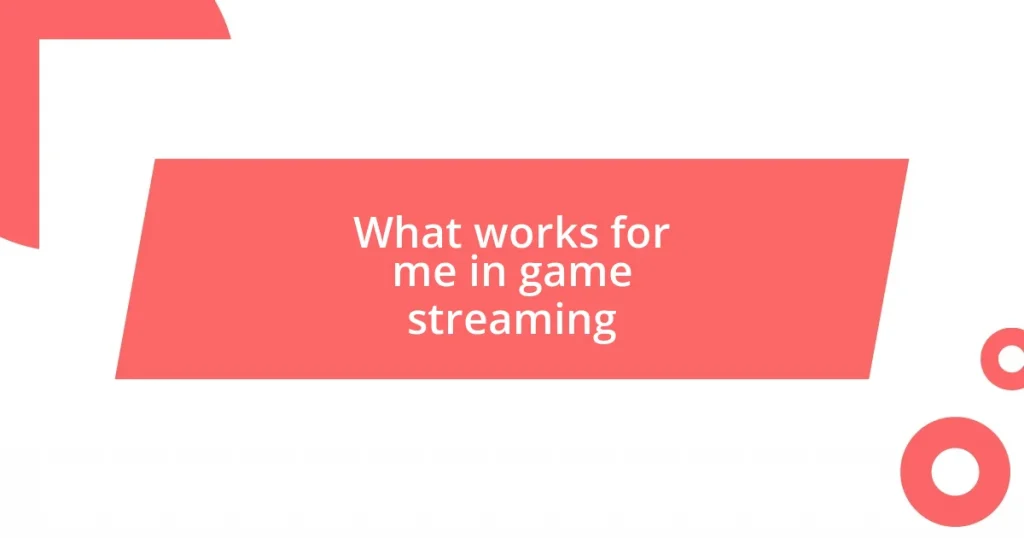Key takeaways:
- Culinary competitions foster innovation and adaptability, allowing chefs to push boundaries and create unique dishes under pressure.
- Emotional connections and networking opportunities built during competitions enhance personal growth and career development in the culinary field.
- Key skills gained from competing include time management, attention to detail, and the importance of constructive feedback to refine cooking techniques.

Overview of Culinary Competitions
Culinary competitions are dynamic events that showcase the skills and creativity of chefs and aspiring cooks. From local cook-offs to prestigious international contests, these events provide a stage for participants to push their boundaries and demonstrate their culinary prowess. I remember the electrifying atmosphere at my first competition—it felt like stepping into a whirlwind of flavors and techniques, each contender eager to leave their mark.
These competitions often have specific themes or challenges, making each unique and exciting. I still recall the thrill of adapting a classic dish into a modern interpretation. It was both exhilarating and nerve-wracking, but it taught me the importance of innovation in the kitchen. Have you ever been put in a position where you had to think on your feet? That rush can lead to some of the most memorable culinary creations!
Moreover, the camaraderie among competitors often surprises me. While the stakes are high, there’s an undeniable sense of support and shared passion for cooking that transcends the competition. You’ll find chefs exchanging tips and encouragement, proving that collaboration can often lead to greater heights, even in a competitive setting. Don’t you think that such connections enrich the culinary experience? In my view, these relationships foster valuable networking opportunities that can be life-changing for aspiring chefs.

Personal Journey in Competitions
As I embarked on my culinary competition journey, I quickly realized that each event was not just a test of skills but also a profound personal experience. I remember standing in front of my station, ingredients laid out like an artist’s palette, each one whispering possibilities. The adrenaline pulsed through me, reminding me that this was not just another day in the kitchen; this was my moment to shine. Did you ever feel that mix of fear and excitement before a big challenge? It’s something I believe transforms us as cooks.
In one particularly memorable competition, I found myself creating a dish that melded flavors from my childhood. I can still feel the warmth of nostalgia as I prepared Grandma’s secret sauce, adding a twist with modern techniques. It was a moment of vulnerability but also a testament to how personal stories can elevate culinary expression. When I plated that dish, it wasn’t just food to me—it was a piece of my heart and history. Have you ever poured your soul into your work like that? It can reflect not just our skills, but who we are inside.
Reflecting on my experiences, I’ve learned that competitions are as much about mental resilience as they are about culinary finesse. There were moments of doubt, especially when I compared my creations to those of others. However, pushing through self-doubt taught me invaluable lessons about self-acceptance and the subjective nature of taste. This growth, I believe, has made me a better chef, not only in skills but in character.
| Aspect | My Experience |
|---|---|
| Emotional Connection | Using family recipes to evoke nostalgia. |
| Adrenaline Rush | The thrill of competition creates an electric atmosphere. |
| Personal Growth | Overcoming self-doubt leads to resilience. |

Key Skills Developed Through Competing
Competing in culinary competitions has sharpened a diverse array of essential skills for me. One standout skill is time management; with ticking clocks everywhere, I learned to prioritize tasks swiftly. On one occasion, I was racing against the countdown, juggling multiple components of my dish—which once felt chaotic—transformed into a rehearsed dance of efficiency. That adrenaline rush taught me how to remain calm under pressure, all while ensuring that each element was plated perfectly.
Here are some key skills I’ve developed through competing:
- Time Management: Mastering the knack of prioritizing tasks to meet tight deadlines.
- Creativity: Learning to innovate and think outside the box to craft unique dishes.
- Attention to Detail: Enhancing my ability to focus on every small aspect, from garnish to flavor balance.
- Collaboration: Building friendships with fellow competitors, leading to shared learning and inspiration.
- Confidence Boost: Gaining self-assurance from overcoming challenges and receiving feedback from judges.
The varied hurdles of competition have also trained me to adapt quickly when faced with unexpected changes. I vividly recall one event where my main ingredient was suddenly unavailable the night before the contest. In that moment, creativity sparked, and I transformed my approach, resulting in a dish that earned praise for its unexpected flair. This not only reinforced my adaptability but instilled a deep appreciation for the beauty of improvisation in the culinary arts. There’s something thrilling about moving beyond your original plan and still delivering something delightful. Have you felt that same rush of creativity when faced with a curveball? It’s these moments that make the competition journey unforgettable.

Understanding Flavor Profiles Better
As I delved deeper into culinary competitions, the concept of flavor profiles became clearer and more nuanced for me. I learned that understanding the balance of sweetness, acidity, bitterness, and umami can significantly elevate a dish. I vividly remember a challenge where I combined roasted butternut squash with a zesty citrus dressing. The way those flavors complemented each other was a revelation—have you ever experienced that perfect harmony on your plate?
Another experience that stands out is the time I had to create a dish using an ingredient I had never worked with before: fennel. Initially, the anise-like flavor intimidated me. However, I discovered that when paired with the right components, it added an exquisite layer to my dish. It made me realize that every ingredient has its story and potential. How do you approach new flavors—you embrace them, or do you sometimes hesitate?
Through these competitions, I’ve come to appreciate the importance of tasting and adjusting as I cook. With judges right around the corner, the pressure was intense, but it forced me to be truly present in each moment. I recall making a quick last-minute adjustment to a sauce—adding just a pinch of salt that transformed it entirely. That single choice not only saved my dish but also deepened my understanding of how small adjustments can create significant impact. Isn’t it fascinating how a single taste can lead to a culinary epiphany?

Networking and Relationships Built
Building connections in the culinary world has been one of the most rewarding aspects of my competition experiences. Each event has offered a chance to meet passionate chefs who share my love for cooking. I remember bonding with a fellow competitor during a late-night prep session over our shared struggles, which transformed us from rivals into friends. Have you ever felt that spark of camaraderie with someone who understands your journey?
The relationships formed during these competitions often extend beyond the kitchen. I once connected with a judge who later became a mentor, guiding my culinary path in ways I never anticipated. It’s incredible how a simple conversation can open doors to new opportunities and collaboration. I often marvel at how these connections can enrich our culinary experiences and lead to future partnerships, isn’t it amazing how networking can shape our careers?
Some friendships have even turned into professional alliances. I partnered with a competitor to create a pop-up event showcasing our unique dishes, which drew quite a crowd and boosted both our profiles. These alliances serve as reminders that, in the culinary world, success is not just about individual accolades but about lifting each other up. It’s fulfilling to realize that sharing our knowledge and experiences can lead to collective growth in such a competitive landscape. Have you ever considered how collaboration could enhance your culinary journey?

Applying Competition Lessons at Home
I’ve learned that the pressure of competition encourages me to brainstorm creative solutions at home. For example, when I faced a time limit during a competition, I quickly developed a strategy for meal prep that I now apply to my weekly cooking. It’s about preparing components that can be easily mixed and matched; for instance, roasted vegetables, seasoned grains, and various proteins all ready to build exciting meals effortlessly. Have you ever thought about how meal prepping could save you time and inspire creativity in your weeknight dinners?
Another valuable lesson I took home from competitions is the critical importance of mise en place—having everything in its place before you start cooking. One evening, I embraced this practice completely, lining up my ingredients and tools methodically. The result was astonishing; not only did I cook more efficiently, but I also felt calmer and more in control. It made me question: what if taking the time to prep could transform chaotic cooking sessions into something more enjoyable and empowering for you too?
I also discovered that embracing feedback, even when it’s tough to hear, can dramatically improve my culinary skills. After receiving constructive criticism from judges, I began inviting friends over for informal cooking sessions where they’d share their thoughts on my dishes. Recently, one friend suggested a daring twist on my signature pasta that led me to explore ingredients I may have otherwise overlooked. Have you considered how accepting input from others could spark innovation in your cooking?















